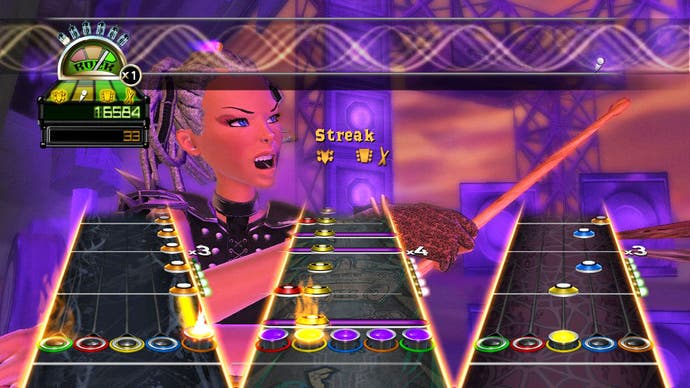Inside Music Games
Let's face the music and dance.
Introduction
For a moment there it looked as if music games had died. Activision had pulled the plug, at least temporarily, on Guitar Hero and DJ Hero, while Viacom had washed its hands of Rock Band developer Harmonix. Soon the news stories became obituaries for the genre that had conquered and cluttered the world with toy guitars.
But just as when the New York Journal pronounced Mark Twain dead by mistake, reports of music gaming's demise turned out to be an exaggeration. Guitar Hero's best days may be behind it, but Ubisoft's Just Dance is flying off the same shelves that were once packed with imitation Gibsons and there's a more-than-healthy supply of new music games on the horizon.
What those declaring the genre's death forgot was that games with pretend instruments are but one strand of a game type that also counts the booty shaking of Dance Central, Rez's techno remix of the on-rails shooter and Donkey Konga's tub-thumping platforming among its number. "Music games include rhythm action controller titles, musical shooters or platformers, simulation games like Rock Band and dance games ranging from Dance Dance Revolution to Dance Central 2," says Greg LoPiccolo, the vice-president of product development at Harmonix.
Q Entertainment's Tetsuya Mizuguchi, the creator of Rez, agrees that music games transcend genre: "Each game we make has a different theme. Lumines is a puzzle game. Child of Eden is a shooter. Space Channel 5 is kind of a musical. We really love music and we're so happy to put music elements into games. I don't care about genres."
What connects them, says Jason Harman, production director of We Sing creators Wired Productions, is of course the music: "In a music game the focus is the music itself, unlike almost every other type of genre where the music plays a secondary role or plays alongside the main gameplay."
A brief history
So it is fitting that 1983's Moondust, the first true music game, defies easy categorisation. Created by virtual reality guru Jaron Lanier, Moondust asked players to pilot a spaceman around the screen and drop seeds.

Once a seed was dropped the goal was to steer spaceships that mirrored the spaceman's movement over the seed in order to smear it towards a shape that Lanier describes as a "writhing, organic, vaguely female-symbolic, astral phenomenon." Freud would have a field day, but more importantly every push of the Commodore 64's joystick would alter the soundtrack allowing players to play it as both a game and an oddball instrument.
The following year the warm and fuzzy tones of the Commodore 64 delivered another step forward for music gaming with Break Street and Break Dance, both inspired by the breakdancing craze. Break Street was more a dancing simulator where you performed and recorded moves, but Break Dance challenged players to copy the actions of a rival b-boy, hitting on the repeat-after-me formula that would become the bedrock of later music games.
The next music game landmark was 1987's Dance Aerobics, a dancercise game for Bandai's Family Trainer – a dance mat-style controller for the NES. But after that the trail goes cold with only brief glimpses of what was to come such as the dancing mini-game in 1993's ToeJam & Earl in Panic on Funkotron.

